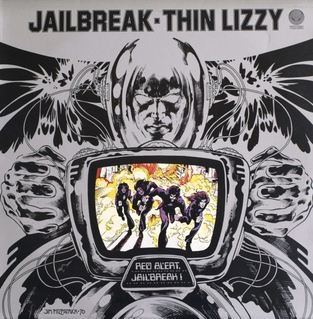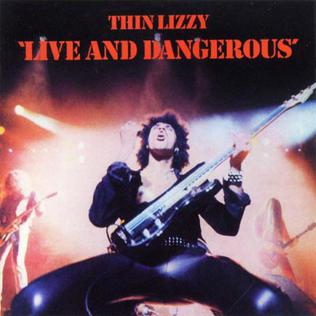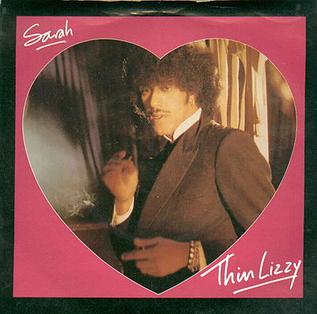
Philip Parris Lynott was an Irish musician, songwriter, and poet. He was the co-founder, lead vocalist, bassist, and primary songwriter for the hard rock band Thin Lizzy. He was known for his distinctive pick-based style on the bass and for his imaginative lyrical contributions, including working class tales and numerous characters drawn from personal influences and Celtic culture.

Run for Cover is the fifth solo studio album by Northern Irish guitarist Gary Moore, released on 2 September 1985. It is often considered his breakthrough album.

Thin Lizzy is the debut studio album by Irish rock band Thin Lizzy, released on 30 April 1971. The album was followed by the EP New Day, produced and recorded by Nick Tauber at Decca Studios on 14–17 June 1971 and released on 20 August 1971. The songs from the EP were included in later editions of the album.

Vagabonds of the Western World is the third studio album by Irish hard rock band Thin Lizzy, released in 1973. It was the band's last album with original guitarist Eric Bell and the first to feature the artwork of Jim Fitzpatrick, whose work would appear on many subsequent albums by the band.

Fighting is the fifth studio album by Irish rock band Thin Lizzy, released in 1975. Following the release of four studio albums, the band finally forged an identifiable sound featuring the twin guitars of Scott Gorham and Brian Robertson. This sound draws from hard rock, folk, pop and rhythm and blues. It set the stage for the big commercial breakthrough of the follow-up album, Jailbreak. The album was also their first album to chart in the UK, hitting No. 60.

Jailbreak is the sixth studio album by Irish hard rock band Thin Lizzy. It was released on 26 March 1976, by Vertigo Records. The album proved to be the band's commercial breakthrough in the US, and the only Thin Lizzy album with a certification in that country. The singles taken from the album include "Jailbreak" and "The Boys Are Back in Town"; the latter is Thin Lizzy's biggest US hit, and won the 1976 NME Award for Best Single.

Johnny the Fox is the seventh studio album by Irish hard rock band Thin Lizzy, released in 1976. This album was written and recorded while bassist/vocalist Phil Lynott was recovering from a bout of hepatitis that put him off the road halfway through the previous Jailbreak tour. "Don't Believe a Word" was a British hit single. Johnny the Fox was the last Thin Lizzy studio album on which guitarist Brian Robertson featured as a full member of the band, as the personality clashes between him and Lynott resulted in Robertson being sacked, reinstated, and later sacked again.

Bad Reputation is the eighth studio album by the Irish rock band Thin Lizzy, released in 1977. As the front cover suggests, most of the tracks feature only three-quarters of the band, with guitarist Brian Robertson only credited on three tracks. He had missed most of their previous tour, following a hand injury sustained in a brawl, and this album turned out to be his last studio effort with Thin Lizzy. On 27 June 2011, a new remastered and expanded version of Bad Reputation was released.

Live and Dangerous is a live double album by the Irish rock band Thin Lizzy, released in June 1978. It was recorded in London in 1976, and Philadelphia and Toronto in 1977, with further production in Paris. It was also the last Thin Lizzy album to feature guitarist Brian Robertson, who left the band shortly after its release.

Black Rose: A Rock Legend is the ninth studio album by Irish rock band Thin Lizzy. Released in 1979, it has been described as one of the band's "greatest, most successful albums". It was the first time that blues rock guitarist Gary Moore remained in Thin Lizzy long enough to record an album—after previous brief stints in 1974 and 1977 with the band. The album peaked at No. 2 on the UK charts-- making it the band's highest-charting album in the UK. It was their fourth consecutive album to be certified Gold by the BPI.

Chinatown is the tenth studio album by Irish band Thin Lizzy, released in 1980. It introduced guitarist Snowy White who would also perform on the next album as well as tour with Thin Lizzy between 1980 and 1982; he replaced Gary Moore as permanent guitarist. White had previously worked with Cliff Richard, Peter Green and Pink Floyd. Chinatown also featured eighteen-year-old Darren Wharton on keyboards, and he joined Thin Lizzy as a permanent member later that year.

Renegade is the eleventh studio album by Irish band Thin Lizzy, released in 1981. Though not his first appearance, this was the first album in which keyboard player Darren Wharton was credited as a permanent member, becoming the fifth member of the line-up. As such, he made a contribution as a songwriter on the opening track "Angel of Death". However, even though he had officially joined the band, his picture was omitted from the album sleeve. Renegade was the second and final album to feature guitarist Snowy White. By his own admission, White was more suited to playing blues than heavy rock and he quit by mutual agreement the following year. He went on to have a hit single with "Bird of Paradise" in 1983.

Nightlife is the fourth studio album by Irish rock band Thin Lizzy, released on 8 November 1974 by Vertigo Records. It was produced by Ron Nevison and bandleader Phil Lynott, and was the first album to feature the band as a quartet with newcomers Scott Gorham and Brian Robertson on guitars.

Remembering – Part 1 is a compilation album by rock group Thin Lizzy, one of the first compilations of the band's early years with Eric Bell, released by their record company at that time, Decca Records, in an apparent attempt to cash in on the chart success Lizzy had recently begun enjoying with Vertigo. It includes "Sitamoia" and "Little Darling", both featuring Gary Moore during his first brief stint with the group, the first of which was previously unreleased. The time frame of the album stretches from 1971 to 1974. The album was issued in the US as Rocker (1971-1974) in 1977 by London Records, with the song "Honesty Is No Excuse" instead of "A Song for While I'm Away".

Solo in Soho is the debut solo album by Irish rock singer Philip Lynott, released while he was still in Thin Lizzy. Current and former Lizzy members guested on the album, including Scott Gorham, Brian Downey, Snowy White, and Gary Moore. Brian Robertson also contributed to the writing of one of the tracks, "Girls".

The Continuing Saga of the Ageing Orphans is a 1979 compilation album by the rock group Thin Lizzy.

Brian Michael Downey is an Irish drummer. He was a founding member of the rock band Thin Lizzy and the only other constant in the band aside from leader Phil Lynott until their disbandment in 1983. Downey also co-wrote several Thin Lizzy songs. Allmusic critic Eduardo Rivadavia has argued that Downey is "certainly one of the most underrated [rock drummers] of his generation".

Whiskey In The Jar is a compilation album by Irish rock band Thin Lizzy, originally released in 1996, covering the early part of the band's career. There are various versions of this album, released by different record companies, with the same track listing but with different covers.

BBC Radio One Live in Concert is a live recording from 1983 by Irish rock band Thin Lizzy, released in 1992. This show at the Reading Festival in 1983 came at the end of their farewell tour, and was originally intended to be the band's last concert.

"Sarah" is a pop song released in 1979 by Irish rock group Thin Lizzy, included on their album, Black Rose: A Rock Legend. The song was written by the band's frontman Phil Lynott and guitarist Gary Moore about Lynott's newborn daughter. The song was also issued as a single, and appeared on several compilation albums including Wild One: The Very Best of Thin Lizzy. The song was never performed live by Thin Lizzy, but it was adopted as a live favourite by Lynott's post-Thin Lizzy project, Grand Slam, and featured on Live in Sweden 1983, a recording of Lynott's solo band.




















